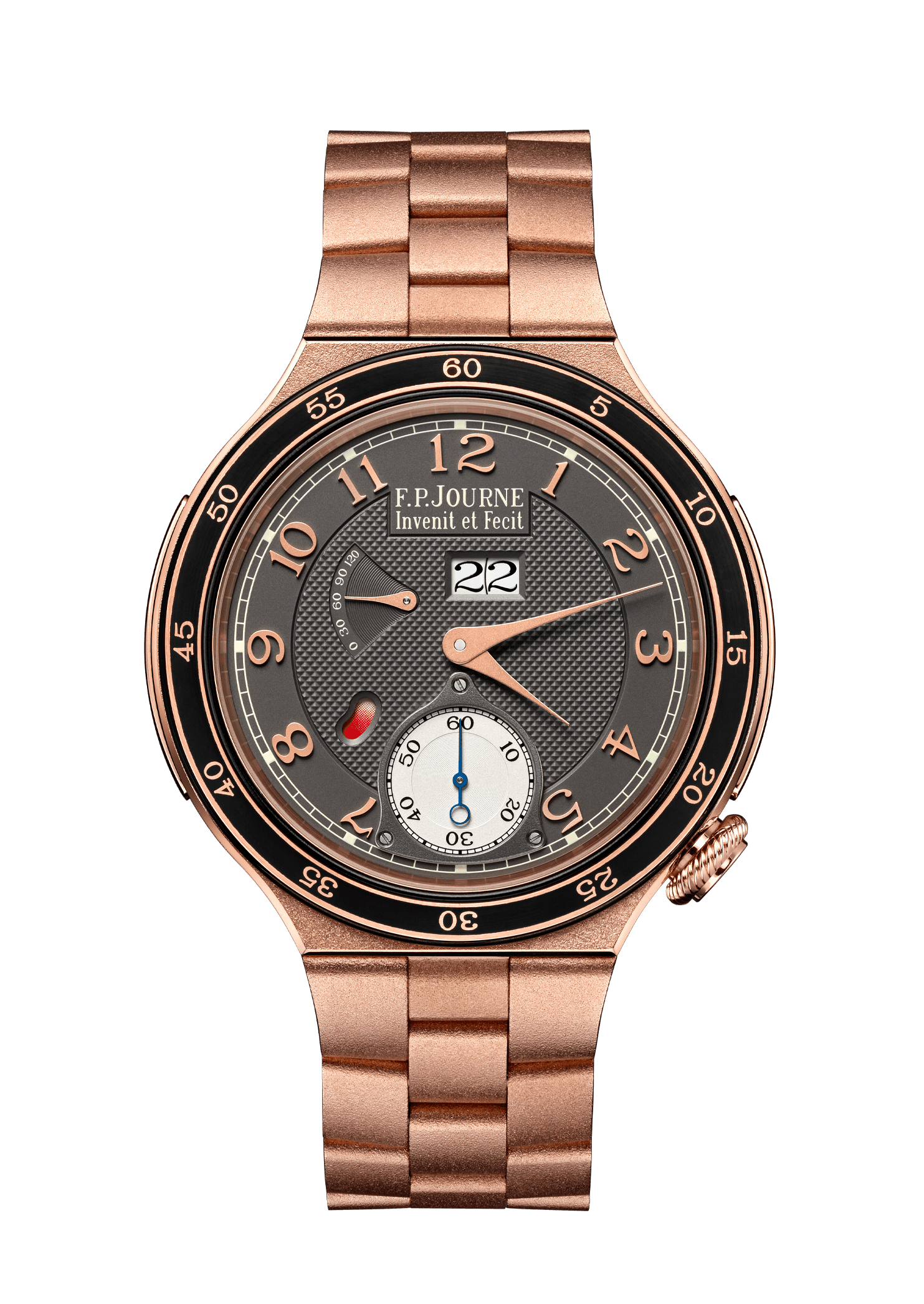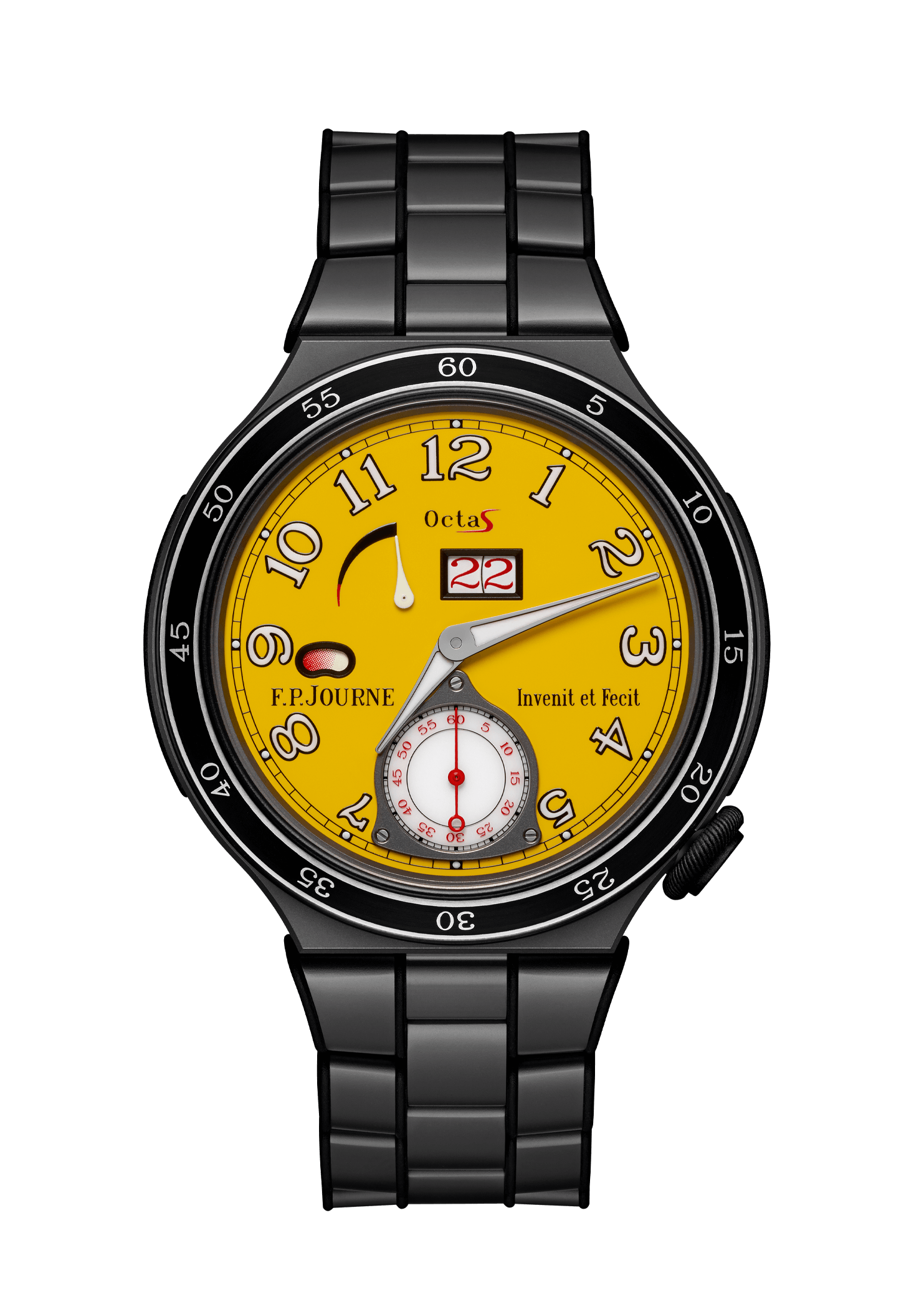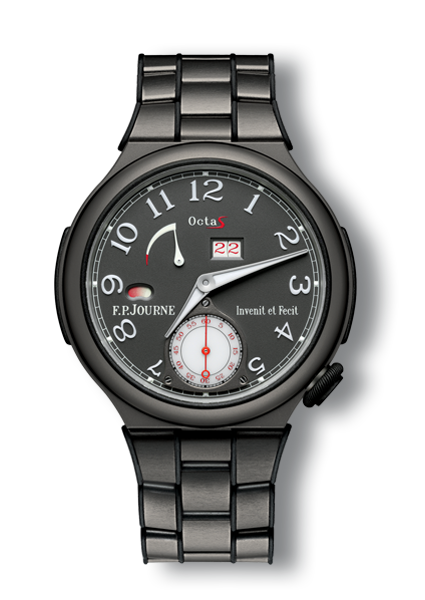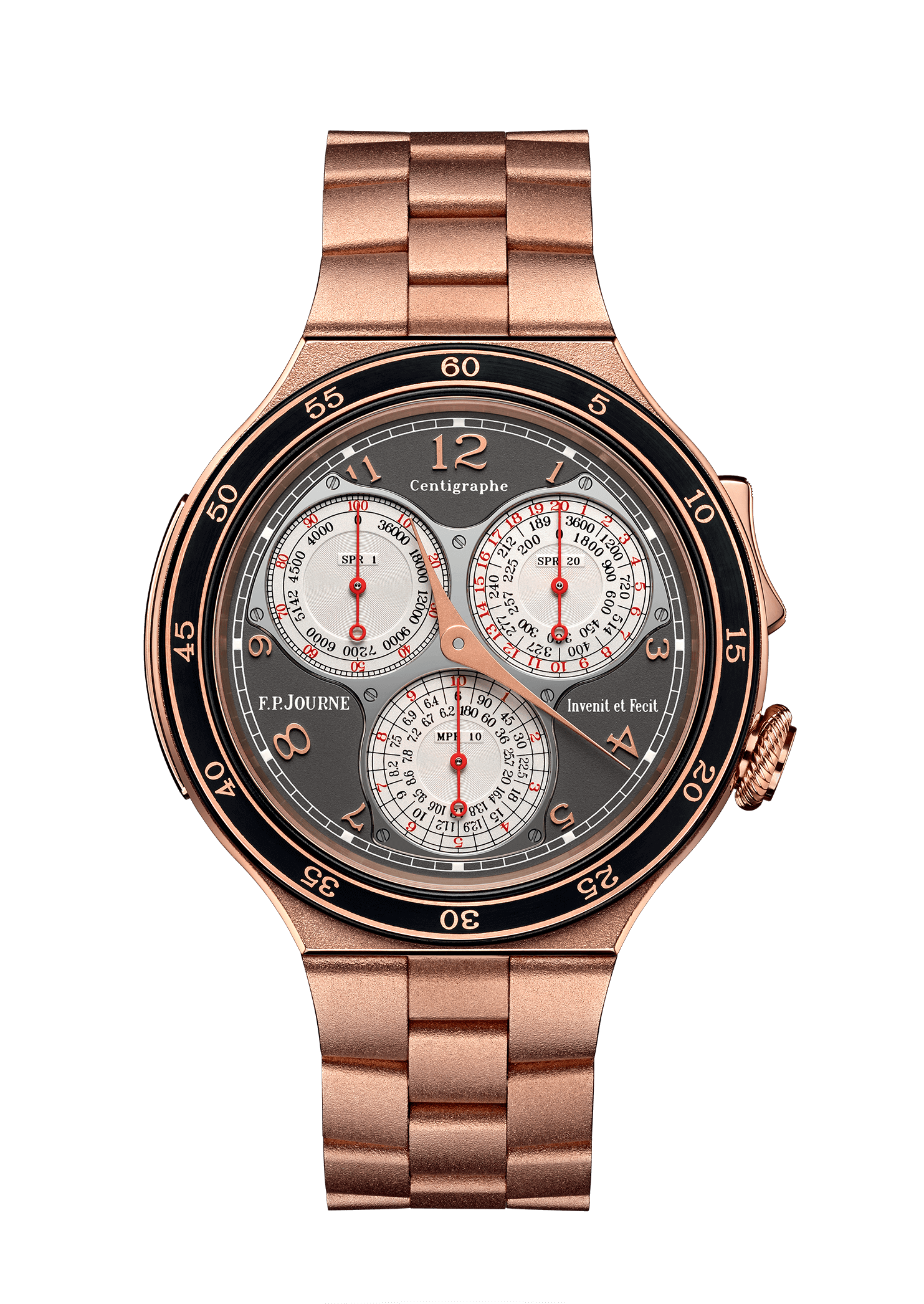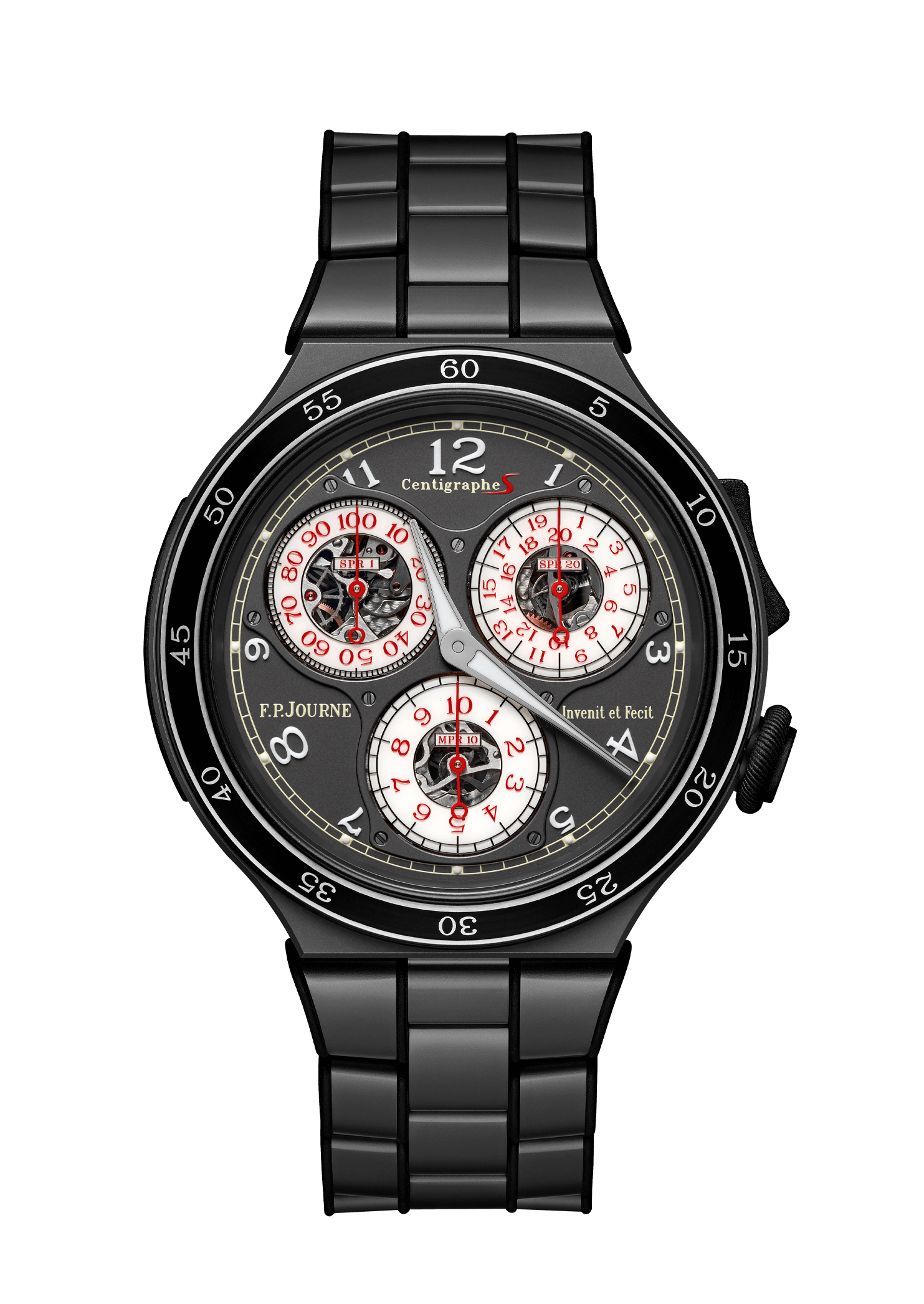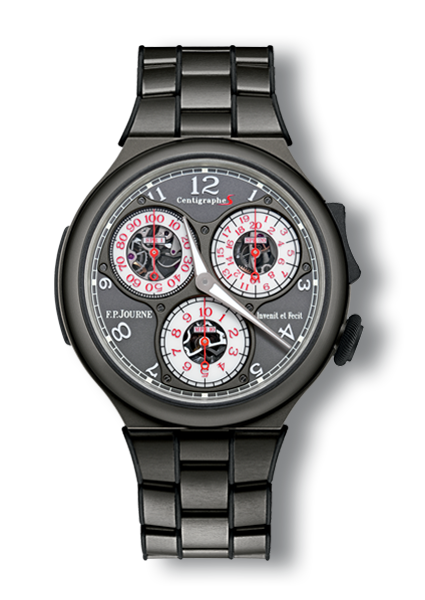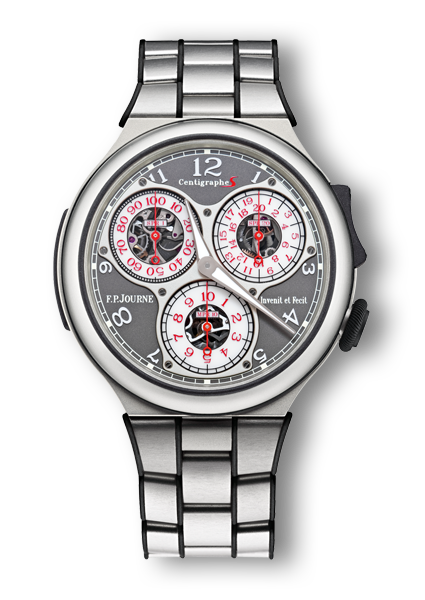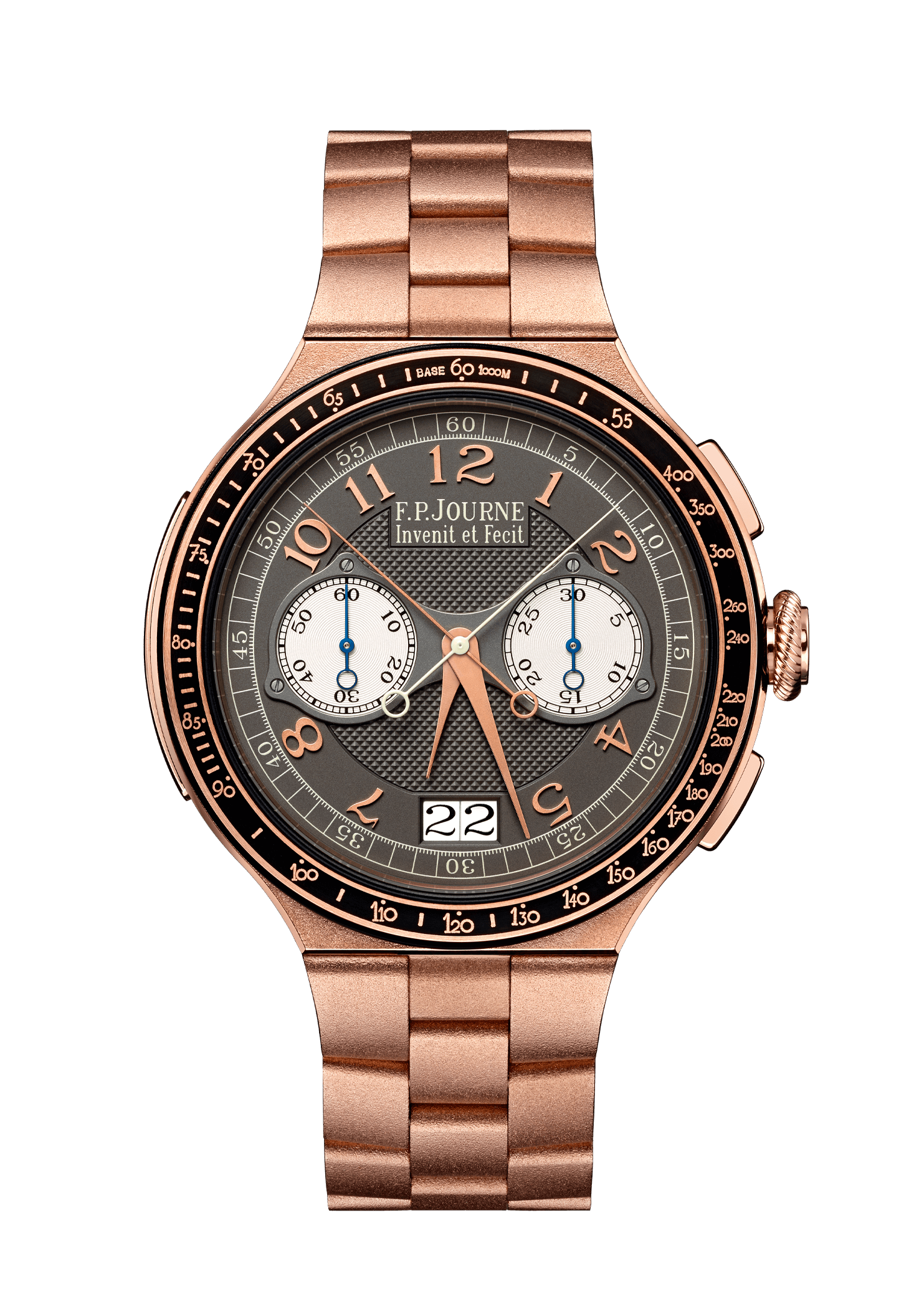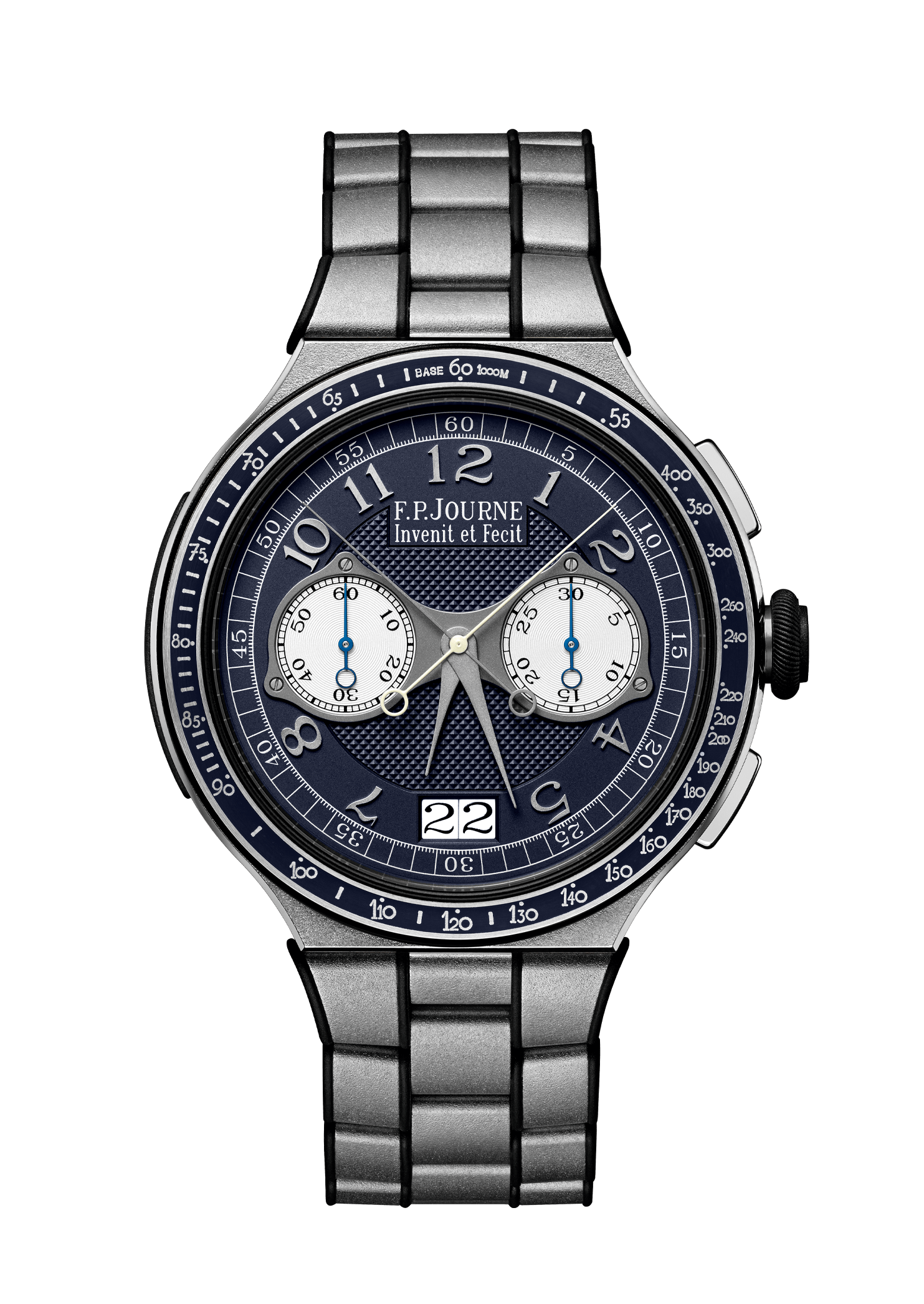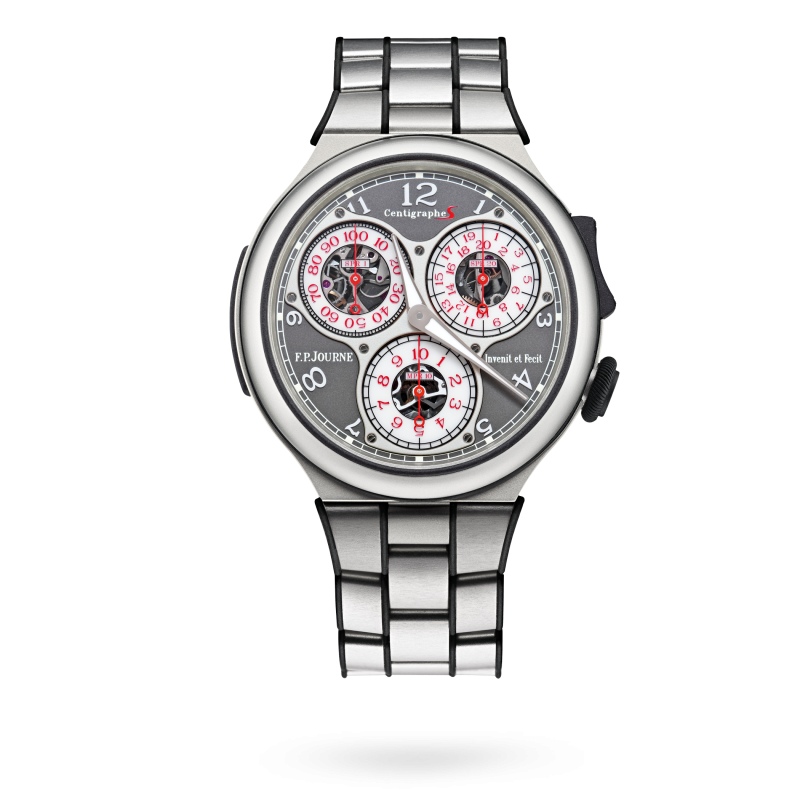Calibre 1506 https://www.fpjourne.com/en/collection/linesport-collection/centigraphe-sport-aluminium FP Journe https://www.fpjourne.com/en FP Journe
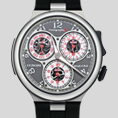
Diameter: 42 mm
Overall height: 11.6 mm
Dial: Aluminium alloy and sapphire with applied luminescent indexes and numerals
Hands: luminescent hands in Steel and red lacquered Titanium
Technical Specifications
Manual Winding
Movement in aluminium alloy
- Overall diameter : 34.40 mm
- Casing-up diameter : 34.00 mm
- Overall height : 5.60 mm
- Height of winding system : 2.69 mm
- Height of hands : 1.45 mm
- Diameter of stem thread : S1.20 mm
Free-sprung balance
Four adjustable inertia weights
Anachron balance spring
Mobile stud holders
Pinned GE stud
Spring pinned to the collect
21'600 Alt/h (3Hz)
10.10 mg / cm2
52°
0h dial up: 320°
24h dial up: 280°
In-line lever escapement
15-tooth escape wheel
Central hours and minutes
One-second chronograph: hand at 10 o'clock.
20-seconds chronograph: hand at 2 o'clock.
10-minutes chronograph: hand at 6 o'clock.
Separate chronograph train driven by directly from the mainspring.
1/100th second readout
80 ± 2 hours with the chronograph stopped
24 ± 2 hours with the chronograph running
Circular stripes on the bridges
Circular graining on the baseplate
Polished screw heads with chamfered slots
Pegs with polished rounded ends
Straight-grained steel work
Manual Winding
Movement in aluminium alloy
- Overall diameter : 34.40 mm
- Casing-up diameter : 34.00 mm
- Overall height : 5.60 mm
- Height of winding system : 2.69 mm
- Height of hands : 1.45 mm
- Diameter of stem thread : S1.20 mm
Free-sprung balance
Four adjustable inertia weights
Anachron balance spring
Mobile stud holders
Pinned GE stud
Spring pinned to the collect
21'600 Alt/h (3Hz)
10.10 mg / cm2
52°
0h dial up: 320°
24h dial up: 280°
In-line lever escapement
15-tooth escape wheel
Central hours and minutes
One-second chronograph: hand at 10 o'clock.
20-seconds chronograph: hand at 2 o'clock.
10-minutes chronograph: hand at 6 o'clock.
Separate chronograph train driven by directly from the mainspring.
1/100th second readout
80 ± 2 hours with the chronograph stopped
24 ± 2 hours with the chronograph running
Circular stripes on the bridges
Circular graining on the baseplate
Polished screw heads with chamfered slots
Pegs with polished rounded ends
Straight-grained steel work
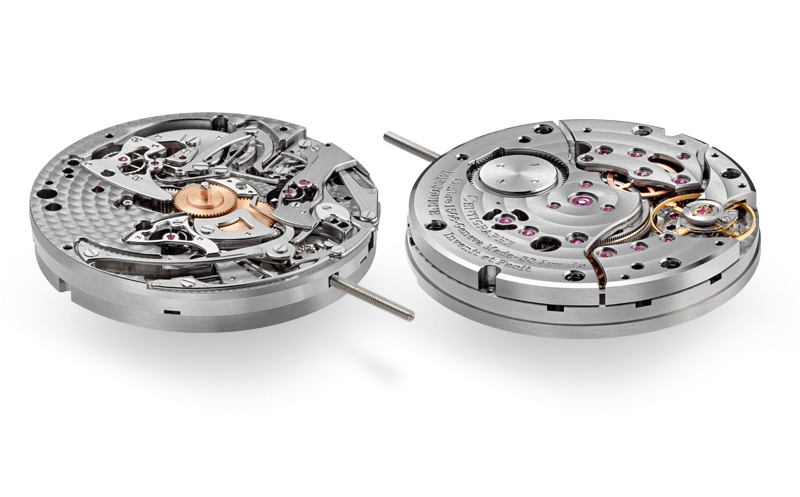
Technical description
The hand-wound mechanical movement of the Centigraphe indicates elapsed times from a 100th of a second to 10 minutes, visible on 3 dials, each with a time scale in red and a tachometer scale in black.
The tachometer scales converts time units for 1 kilometre into speeds ranging from 6 km/h —walking pace — to 36,000 km/h, well above the escape velocity of a rocket going into low-level orbit.

Technical description
The hand-wound mechanical movement of the Centigraphe indicates elapsed times from a 100th of a second to 10 minutes, visible on 3 dials, each with a time scale in red and a tachometer scale in black.
The tachometer scales converts time units for 1 kilometre into speeds ranging from 6 km/h —walking pace — to 36,000 km/h, well above the escape velocity of a rocket going into low-level orbit.
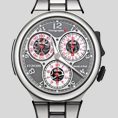
Diameter: 42 mm
Overall height: 11.6 mm
Dial: Aluminium alloy and sapphire with luminescent indexes and numbers
Hands: luminescent hands in Steel and red lacquered Titanium
Technical Specifications
Manual Winding
Movement in aluminium alloy
- Overall diameter : 34.40 mm
- Casing-up diameter : 34.00 mm
- Overall height : 5.60 mm
- Height of winding system : 2.69 mm
- Height of hands : 1.45 mm
- Diameter of stem thread : S1.20 mm
Free-sprung balance
Four adjustable inertia weights
Anachron balance spring
Mobile stud holders
Pinned GE stud
Spring pinned to the collect
21'600 Alt/h (3Hz)
10.10 mg / cm2
52°
0h dial up: 320°
24h dial up: 280°
In-line lever escapement
15-tooth escape wheel
Central hours and minutes
One-second chronograph: hand at 10 o'clock.
20-seconds chronograph: hand at 2 o'clock.
10-minutes chronograph: hand at 6 o'clock.
Separate chronograph train driven by directly from the mainspring.
1/100th second readout
80 ± 2 hours with the chronograph stopped
24 ± 2 hours with the chronograph running
Circular stripes on the bridges
Circular graining on the baseplate
Polished screw heads with chamfered slots
Pegs with polished rounded ends
Straight-grained steel work
Manual Winding
Movement in aluminium alloy
- Overall diameter : 34.40 mm
- Casing-up diameter : 34.00 mm
- Overall height : 5.60 mm
- Height of winding system : 2.69 mm
- Height of hands : 1.45 mm
- Diameter of stem thread : S1.20 mm
Free-sprung balance
Four adjustable inertia weights
Anachron balance spring
Mobile stud holders
Pinned GE stud
Spring pinned to the collect
21'600 Alt/h (3Hz)
10.10 mg / cm2
52°
0h dial up: 320°
24h dial up: 280°
In-line lever escapement
15-tooth escape wheel
Central hours and minutes
One-second chronograph: hand at 10 o'clock.
20-seconds chronograph: hand at 2 o'clock.
10-minutes chronograph: hand at 6 o'clock.
Separate chronograph train driven by directly from the mainspring.
1/100th second readout
80 ± 2 hours with the chronograph stopped
24 ± 2 hours with the chronograph running
Circular stripes on the bridges
Circular graining on the baseplate
Polished screw heads with chamfered slots
Pegs with polished rounded ends
Straight-grained steel work

Technical description
The hand-wound mechanical movement of the Centigraphe indicates elapsed times from a 100th of a second to 10 minutes, visible on 3 dials, each with a time scale in red and a tachometer scale in black.
The tachometer scales converts time units for 1 kilometre into speeds ranging from 6 km/h —walking pace — to 36,000 km/h, well above the escape velocity of a rocket going into low-level orbit.

Technical description
The hand-wound mechanical movement of the Centigraphe indicates elapsed times from a 100th of a second to 10 minutes, visible on 3 dials, each with a time scale in red and a tachometer scale in black.
The tachometer scales converts time units for 1 kilometre into speeds ranging from 6 km/h —walking pace — to 36,000 km/h, well above the escape velocity of a rocket going into low-level orbit.
Diameter: 42 mm
Overall height: 11.6 mm
Dial: Aluminium alloy and sapphire with applied luminescent indexes and numerals
Hands: luminescent hands in Steel and red lacquered Titanium

Diameter: 42 mm
Overall height: 11.6 mm
Dial: Aluminium alloy and sapphire with applied luminescent indexes and numerals
Hands: luminescent hands in Steel and red lacquered Titanium
Technical Specifications
Manual Winding
Movement in aluminium alloy
- Overall diameter : 34.40 mm
- Casing-up diameter : 34.00 mm
- Overall height : 5.60 mm
- Height of winding system : 2.69 mm
- Height of hands : 1.45 mm
- Diameter of stem thread : S1.20 mm
Free-sprung balance
Four adjustable inertia weights
Anachron balance spring
Mobile stud holders
Pinned GE stud
Spring pinned to the collect
21'600 Alt/h (3Hz)
10.10 mg / cm2
52°
0h dial up: 320°
24h dial up: 280°
In-line lever escapement
15-tooth escape wheel
Central hours and minutes
One-second chronograph: hand at 10 o'clock.
20-seconds chronograph: hand at 2 o'clock.
10-minutes chronograph: hand at 6 o'clock.
Separate chronograph train driven by directly from the mainspring.
1/100th second readout
80 ± 2 hours with the chronograph stopped
24 ± 2 hours with the chronograph running
Circular stripes on the bridges
Circular graining on the baseplate
Polished screw heads with chamfered slots
Pegs with polished rounded ends
Straight-grained steel work
Manual Winding
Movement in aluminium alloy
- Overall diameter : 34.40 mm
- Casing-up diameter : 34.00 mm
- Overall height : 5.60 mm
- Height of winding system : 2.69 mm
- Height of hands : 1.45 mm
- Diameter of stem thread : S1.20 mm
Free-sprung balance
Four adjustable inertia weights
Anachron balance spring
Mobile stud holders
Pinned GE stud
Spring pinned to the collect
21'600 Alt/h (3Hz)
10.10 mg / cm2
52°
0h dial up: 320°
24h dial up: 280°
In-line lever escapement
15-tooth escape wheel
Central hours and minutes
One-second chronograph: hand at 10 o'clock.
20-seconds chronograph: hand at 2 o'clock.
10-minutes chronograph: hand at 6 o'clock.
Separate chronograph train driven by directly from the mainspring.
1/100th second readout
80 ± 2 hours with the chronograph stopped
24 ± 2 hours with the chronograph running
Circular stripes on the bridges
Circular graining on the baseplate
Polished screw heads with chamfered slots
Pegs with polished rounded ends
Straight-grained steel work

Technical description
The hand-wound mechanical movement of the Centigraphe indicates elapsed times from a 100th of a second to 10 minutes, visible on 3 dials, each with a time scale in red and a tachometer scale in black.
The tachometer scales converts time units for 1 kilometre into speeds ranging from 6 km/h —walking pace — to 36,000 km/h, well above the escape velocity of a rocket going into low-level orbit.

Technical description
The hand-wound mechanical movement of the Centigraphe indicates elapsed times from a 100th of a second to 10 minutes, visible on 3 dials, each with a time scale in red and a tachometer scale in black.
The tachometer scales converts time units for 1 kilometre into speeds ranging from 6 km/h —walking pace — to 36,000 km/h, well above the escape velocity of a rocket going into low-level orbit.

Diameter: 42 mm
Overall height: 11.6 mm
Dial: Aluminium alloy and sapphire with luminescent indexes and numbers
Hands: luminescent hands in Steel and red lacquered Titanium
Technical Specifications
Manual Winding
Movement in aluminium alloy
- Overall diameter : 34.40 mm
- Casing-up diameter : 34.00 mm
- Overall height : 5.60 mm
- Height of winding system : 2.69 mm
- Height of hands : 1.45 mm
- Diameter of stem thread : S1.20 mm
Free-sprung balance
Four adjustable inertia weights
Anachron balance spring
Mobile stud holders
Pinned GE stud
Spring pinned to the collect
21'600 Alt/h (3Hz)
10.10 mg / cm2
52°
0h dial up: 320°
24h dial up: 280°
In-line lever escapement
15-tooth escape wheel
Central hours and minutes
One-second chronograph: hand at 10 o'clock.
20-seconds chronograph: hand at 2 o'clock.
10-minutes chronograph: hand at 6 o'clock.
Separate chronograph train driven by directly from the mainspring.
1/100th second readout
80 ± 2 hours with the chronograph stopped
24 ± 2 hours with the chronograph running
Circular stripes on the bridges
Circular graining on the baseplate
Polished screw heads with chamfered slots
Pegs with polished rounded ends
Straight-grained steel work
Manual Winding
Movement in aluminium alloy
- Overall diameter : 34.40 mm
- Casing-up diameter : 34.00 mm
- Overall height : 5.60 mm
- Height of winding system : 2.69 mm
- Height of hands : 1.45 mm
- Diameter of stem thread : S1.20 mm
Free-sprung balance
Four adjustable inertia weights
Anachron balance spring
Mobile stud holders
Pinned GE stud
Spring pinned to the collect
21'600 Alt/h (3Hz)
10.10 mg / cm2
52°
0h dial up: 320°
24h dial up: 280°
In-line lever escapement
15-tooth escape wheel
Central hours and minutes
One-second chronograph: hand at 10 o'clock.
20-seconds chronograph: hand at 2 o'clock.
10-minutes chronograph: hand at 6 o'clock.
Separate chronograph train driven by directly from the mainspring.
1/100th second readout
80 ± 2 hours with the chronograph stopped
24 ± 2 hours with the chronograph running
Circular stripes on the bridges
Circular graining on the baseplate
Polished screw heads with chamfered slots
Pegs with polished rounded ends
Straight-grained steel work

Technical description
The hand-wound mechanical movement of the Centigraphe indicates elapsed times from a 100th of a second to 10 minutes, visible on 3 dials, each with a time scale in red and a tachometer scale in black.
The tachometer scales converts time units for 1 kilometre into speeds ranging from 6 km/h —walking pace — to 36,000 km/h, well above the escape velocity of a rocket going into low-level orbit.

Technical description
The hand-wound mechanical movement of the Centigraphe indicates elapsed times from a 100th of a second to 10 minutes, visible on 3 dials, each with a time scale in red and a tachometer scale in black.
The tachometer scales converts time units for 1 kilometre into speeds ranging from 6 km/h —walking pace — to 36,000 km/h, well above the escape velocity of a rocket going into low-level orbit.
About
François-Paul Journe unveils a new sporty exclusive time measurement and launches the first mechanical chronograph of high horology on a wristwatch entirely in Aluminium alloy: case, bracelet and movement.
F.P. Journe chose the Centigraphe as the first timepiece to introduce its new collection, the lineSport. A collection of new watches of an astounding lightness, thought and conceived specifically for a proficient sporting activity. On 27 May 2012, the Centigraphe Sport participated to its first official motor sport race, the Indy500, on Jean Alesi’s wrist and its colors were emblazoned on the black and gold Lotus Dallara.
More details on the event: www.fpjourne.com/indy500/en/
The hand-wound mechanical movement of the Centigraphe indicates elapsed times from a 100th of a second to 10 minutes, visible on 3 dials, each with a time scale in red.
The indications
The 100th of a second hand revolves around the dial in one second on a scale marked in hundredths of a second.
On the dial at 2 o’clock, the hand revolves once every 20 seconds on a time scale divided into seconds.
The third dial, at 6 o’clock is graduated for 10 minutes.
Patented ergonomic chronograph
The chronograph is started, stopped and zeroed by a rocker at 2 o’clock in the case band, instead of the usual buttons on either side of the crown. This ergonomic design, perfectly fitted to the wristwatch, is patented.
Patented chronograph mechanism
A second patent was granted for the mechanism’s ingenious configuration, which effectively isolates the chronograph from the timekeeping function. This means the balance amplitude is unaffected when the chronograph is running.
The hands of the 100th of a second counter, the 20 seconds, and the 10 minutes are driven by two different wheel trains, themselves driven by the centre of the mainspring (patented).
Another separate train of wheels, also driven by the barrel arbor, drives the 10 minute hand.
1/100th second recorder hand
The 100th of a second’s hand, released by the watch's escapement, makes one revolution of the dial per second. A wheel mounted on the escape wheel (4th wheel of the going train) releases the arbor to which the hand is fitted. The seconds are driven by the going train from the barrel, and by the energy of the chronograph train, as transmitted by the barrel arbor.
One ingenious feature of the 100th of a second is that it may be stopped anywhere along its one-second journey around the dial, even between two 100th of a second divisions, enabling a fractional reading.
This is achieved by vertically disengaging the pinion of the 100th of a second hand from that of the escapement, which presses on the pivot shank and acts as a brake.
Return to zero
The 20-second and the 10-minute hand arbors are zeroed by hammer levers acting on snail cams. The 100th of a second hand is stopped at zero by a beak protruding from its pinion, which presses on a lever, thus blocking the chronograph train.
Maintaining power and power reserve
The barrel features a maintaining power system in order to ensure that the driving force does not decrease during winding.
The mainspring supplies at least 80 hours of power reserve without the chronograph, and 24 hours with the chronograph running.
The Centigraphe Sport contributes to the medical research of the ICM
Godfather of the Centigraphe Souverain, Jean Todt remains the initiator of F.P.Journe’s engagement towards the ICM –Institute of Brain and Spinal Cord in Paris- to help fight diseases such as Alzheimer’s, Parkinson’s, and Multiple Sclerosis.
In purchasing the Centigraphe Sport, in line with the Centigraphe Souverain, you are also supporting the medical research carried out by the ICM.
Along with Professor Gérard Saillant, Luc Besson, Jean Réno, Jean Todt, Michelle Yeoh and Michael Schumacher, amongst others, François-Paul Journe has committed to the ICM in donating 30% of the profits from the sale of each Centigraphe Sport to the ICM, with no limit in time.
Technical Specifications
Manual Winding
Movement in aluminium alloy
- Overall diameter : 34.40 mm
- Casing-up diameter : 34.00 mm
- Overall height : 5.60 mm
- Height of winding system : 2.69 mm
- Height of hands : 1.45 mm
- Diameter of stem thread : S1.20 mm
Free-sprung balance
Four adjustable inertia weights
Anachron balance spring
Mobile stud holders
Pinned GE stud
Spring pinned to the collect
21'600 Alt/h (3Hz)
10.10 mg / cm2
52°
0h dial up: 320°
24h dial up: 280°
In-line lever escapement
15-tooth escape wheel
Central hours and minutes
One-second chronograph: hand at 10 o'clock.
20-seconds chronograph: hand at 2 o'clock.
10-minutes chronograph: hand at 6 o'clock.
Separate chronograph train driven by directly from the mainspring.
1/100th second readout
80 ± 2 hours with the chronograph stopped
24 ± 2 hours with the chronograph running
Circular stripes on the bridges
Circular graining on the baseplate
Polished screw heads with chamfered slots
Pegs with polished rounded ends
Straight-grained steel work
Manual Winding
Movement in aluminium alloy
- Overall diameter : 34.40 mm
- Casing-up diameter : 34.00 mm
- Overall height : 5.60 mm
- Height of winding system : 2.69 mm
- Height of hands : 1.45 mm
- Diameter of stem thread : S1.20 mm
Free-sprung balance
Four adjustable inertia weights
Anachron balance spring
Mobile stud holders
Pinned GE stud
Spring pinned to the collect
21'600 Alt/h (3Hz)
10.10 mg / cm2
52°
0h dial up: 320°
24h dial up: 280°
In-line lever escapement
15-tooth escape wheel
Central hours and minutes
One-second chronograph: hand at 10 o'clock.
20-seconds chronograph: hand at 2 o'clock.
10-minutes chronograph: hand at 6 o'clock.
Separate chronograph train driven by directly from the mainspring.
1/100th second readout
80 ± 2 hours with the chronograph stopped
24 ± 2 hours with the chronograph running
Circular stripes on the bridges
Circular graining on the baseplate
Polished screw heads with chamfered slots
Pegs with polished rounded ends
Straight-grained steel work

Technical description
The hand-wound mechanical movement of the Centigraphe indicates elapsed times from a 100th of a second to 10 minutes, visible on 3 dials, each with a time scale in red and a tachometer scale in black.
The tachometer scales converts time units for 1 kilometre into speeds ranging from 6 km/h —walking pace — to 36,000 km/h, well above the escape velocity of a rocket going into low-level orbit.

Technical description
The hand-wound mechanical movement of the Centigraphe indicates elapsed times from a 100th of a second to 10 minutes, visible on 3 dials, each with a time scale in red and a tachometer scale in black.
The tachometer scales converts time units for 1 kilometre into speeds ranging from 6 km/h —walking pace — to 36,000 km/h, well above the escape velocity of a rocket going into low-level orbit.
-
About
This model was produced between 2011 and 2014
François-Paul Journe unveils a new sporty exclusive time measurement and launches the first mechanical chronograph of high horology on a wristwatch entirely in Aluminium alloy: case, bracelet and movement.
F.P. Journe chose the Centigraphe as the first timepiece to introduce its new collection, the lineSport. A collection of new watches of an astounding lightness, thought and conceived specifically for a proficient sporting activity. On 27 May 2012, the Centigraphe Sport participated to its first official motor sport race, the Indy500, on Jean Alesi’s wrist and its colors were emblazoned on the black and gold Lotus Dallara.
More details on the event: www.fpjourne.com/indy500/en/
The hand-wound mechanical movement of the Centigraphe indicates elapsed times from a 100th of a second to 10 minutes, visible on 3 dials, each with a time scale in red.
The indications
The 100th of a second hand revolves around the dial in one second on a scale marked in hundredths of a second.
On the dial at 2 o’clock, the hand revolves once every 20 seconds on a time scale divided into seconds.
The third dial, at 6 o’clock is graduated for 10 minutes.
Patented ergonomic chronograph
The chronograph is started, stopped and zeroed by a rocker at 2 o’clock in the case band, instead of the usual buttons on either side of the crown. This ergonomic design, perfectly fitted to the wristwatch, is patented.
Patented chronograph mechanism
A second patent was granted for the mechanism’s ingenious configuration, which effectively isolates the chronograph from the timekeeping function. This means the balance amplitude is unaffected when the chronograph is running.
The hands of the 100th of a second counter, the 20 seconds, and the 10 minutes are driven by two different wheel trains, themselves driven by the centre of the mainspring (patented).
Another separate train of wheels, also driven by the barrel arbor, drives the 10 minute hand.
1/100th second recorder hand
The 100th of a second’s hand, released by the watch's escapement, makes one revolution of the dial per second. A wheel mounted on the escape wheel (4th wheel of the going train) releases the arbor to which the hand is fitted. The seconds are driven by the going train from the barrel, and by the energy of the chronograph train, as transmitted by the barrel arbor.
One ingenious feature of the 100th of a second is that it may be stopped anywhere along its one-second journey around the dial, even between two 100th of a second divisions, enabling a fractional reading.
This is achieved by vertically disengaging the pinion of the 100th of a second hand from that of the escapement, which presses on the pivot shank and acts as a brake.
Return to zero
The 20-second and the 10-minute hand arbors are zeroed by hammer levers acting on snail cams. The 100th of a second hand is stopped at zero by a beak protruding from its pinion, which presses on a lever, thus blocking the chronograph train.
Maintaining power and power reserve
The barrel features a maintaining power system in order to ensure that the driving force does not decrease during winding.
The mainspring supplies at least 80 hours of power reserve without the chronograph, and 24 hours with the chronograph running.
The Centigraphe Sport contributes to the medical research of the ICM
Godfather of the Centigraphe Souverain, Jean Todt remains the initiator of F.P.Journe’s engagement towards the ICM –Institute of Brain and Spinal Cord in Paris- to help fight diseases such as Alzheimer’s, Parkinson’s, and Multiple Sclerosis.
In purchasing the Centigraphe Sport, in line with the Centigraphe Souverain, you are also supporting the medical research carried out by the ICM.
Along with Professor Gérard Saillant, Luc Besson, Jean Réno, Jean Todt, Michelle Yeoh and Michael Schumacher, amongst others, François-Paul Journe has committed to the ICM in donating 30% of the profits from the sale of each Centigraphe Sport to the ICM, with no limit in time.
-
Technical description
Technical Specifications
Movement :Manual Winding
Movement in aluminium alloyDimensions :- Overall diameter : 34.40 mm
- Casing-up diameter : 34.00 mm
- Overall height : 5.60 mm
- Height of winding system : 2.69 mm
- Height of hands : 1.45 mm
- Diameter of stem thread : S1.20 mm
Balance :Free-sprung balance
Four adjustable inertia weights
Anachron balance spring
Mobile stud holders
Pinned GE stud
Spring pinned to the collectFREQUENCY :21'600 Alt/h (3Hz)
INERTIA :10.10 mg / cm2
ANGLE OF LIFT :52°
AMPLITUDE :0h dial up: 320°
24h dial up: 280°Escapement :In-line lever escapement
15-tooth escape wheelINDICATIONS :Central hours and minutes
One-second chronograph: hand at 10 o'clock.
20-seconds chronograph: hand at 2 o'clock.
10-minutes chronograph: hand at 6 o'clock.CHRONOGRAPH :Separate chronograph train driven by directly from the mainspring.
1/100th second readoutAutonomy :80 ± 2 hours with the chronograph stopped
24 ± 2 hours with the chronograph runningFinishes :Circular stripes on the bridges
Circular graining on the baseplate
Polished screw heads with chamfered slots
Pegs with polished rounded ends
Straight-grained steel workMovement :Manual Winding
Movement in aluminium alloyDimensions :- Overall diameter : 34.40 mm
- Casing-up diameter : 34.00 mm
- Overall height : 5.60 mm
- Height of winding system : 2.69 mm
- Height of hands : 1.45 mm
- Diameter of stem thread : S1.20 mm
Balance :Free-sprung balance
Four adjustable inertia weights
Anachron balance spring
Mobile stud holders
Pinned GE stud
Spring pinned to the collectFREQUENCY :21'600 Alt/h (3Hz)
INERTIA :10.10 mg / cm2
ANGLE OF LIFT :52°
AMPLITUDE :0h dial up: 320°
24h dial up: 280°Escapement :In-line lever escapement
15-tooth escape wheelINDICATIONS :Central hours and minutes
One-second chronograph: hand at 10 o'clock.
20-seconds chronograph: hand at 2 o'clock.
10-minutes chronograph: hand at 6 o'clock.CHRONOGRAPH :Separate chronograph train driven by directly from the mainspring.
1/100th second readoutAutonomy :80 ± 2 hours with the chronograph stopped
24 ± 2 hours with the chronograph runningFinishes :Circular stripes on the bridges
Circular graining on the baseplate
Polished screw heads with chamfered slots
Pegs with polished rounded ends
Straight-grained steel work
At the heart of the movementAt the heart of the movementBrevet - EP 1 978 424 A1 - EP 1 818 734 A1Technical description
The hand-wound mechanical movement of the Centigraphe indicates elapsed times from a 100th of a second to 10 minutes, visible on 3 dials, each with a time scale in red and a tachometer scale in black.
The tachometer scales converts time units for 1 kilometre into speeds ranging from 6 km/h —walking pace — to 36,000 km/h, well above the escape velocity of a rocket going into low-level orbit.Brevet - EP 1 978 424 A1 - EP 1 818 734 A1
Technical description
The hand-wound mechanical movement of the Centigraphe indicates elapsed times from a 100th of a second to 10 minutes, visible on 3 dials, each with a time scale in red and a tachometer scale in black.
The tachometer scales converts time units for 1 kilometre into speeds ranging from 6 km/h —walking pace — to 36,000 km/h, well above the escape velocity of a rocket going into low-level orbit.
Technical Specifications
Manual Winding
Movement in aluminium alloy
- Overall diameter : 34.40 mm
- Casing-up diameter : 34.00 mm
- Overall height : 5.60 mm
- Height of winding system : 2.69 mm
- Height of hands : 1.45 mm
- Diameter of stem thread : S1.20 mm
Free-sprung balance
Four adjustable inertia weights
Anachron balance spring
Mobile stud holders
Pinned GE stud
Spring pinned to the collect
21'600 Alt/h (3Hz)
10.10 mg / cm2
52°
0h dial up: 320°
24h dial up: 280°
In-line lever escapement
15-tooth escape wheel
Central hours and minutes
One-second chronograph: hand at 10 o'clock.
20-seconds chronograph: hand at 2 o'clock.
10-minutes chronograph: hand at 6 o'clock.
Separate chronograph train driven by directly from the mainspring.
1/100th second readout
80 ± 2 hours with the chronograph stopped
24 ± 2 hours with the chronograph running
Circular stripes on the bridges
Circular graining on the baseplate
Polished screw heads with chamfered slots
Pegs with polished rounded ends
Straight-grained steel work
Manual Winding
Movement in aluminium alloy
- Overall diameter : 34.40 mm
- Casing-up diameter : 34.00 mm
- Overall height : 5.60 mm
- Height of winding system : 2.69 mm
- Height of hands : 1.45 mm
- Diameter of stem thread : S1.20 mm
Free-sprung balance
Four adjustable inertia weights
Anachron balance spring
Mobile stud holders
Pinned GE stud
Spring pinned to the collect
21'600 Alt/h (3Hz)
10.10 mg / cm2
52°
0h dial up: 320°
24h dial up: 280°
In-line lever escapement
15-tooth escape wheel
Central hours and minutes
One-second chronograph: hand at 10 o'clock.
20-seconds chronograph: hand at 2 o'clock.
10-minutes chronograph: hand at 6 o'clock.
Separate chronograph train driven by directly from the mainspring.
1/100th second readout
80 ± 2 hours with the chronograph stopped
24 ± 2 hours with the chronograph running
Circular stripes on the bridges
Circular graining on the baseplate
Polished screw heads with chamfered slots
Pegs with polished rounded ends
Straight-grained steel work

Technical description
The hand-wound mechanical movement of the Centigraphe indicates elapsed times from a 100th of a second to 10 minutes, visible on 3 dials, each with a time scale in red and a tachometer scale in black.
The tachometer scales converts time units for 1 kilometre into speeds ranging from 6 km/h —walking pace — to 36,000 km/h, well above the escape velocity of a rocket going into low-level orbit.

Technical description
The hand-wound mechanical movement of the Centigraphe indicates elapsed times from a 100th of a second to 10 minutes, visible on 3 dials, each with a time scale in red and a tachometer scale in black.
The tachometer scales converts time units for 1 kilometre into speeds ranging from 6 km/h —walking pace — to 36,000 km/h, well above the escape velocity of a rocket going into low-level orbit.
